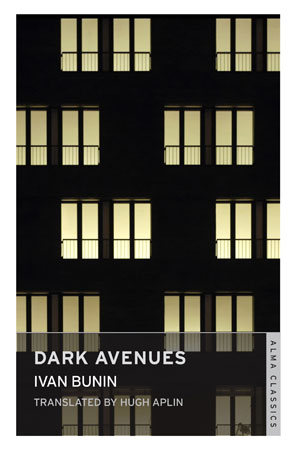 Reviewed by P.P.O. Kane
Reviewed by P.P.O. Kane
Dark Avenues
By Ivan Bunin
Translated by Hugh Aplin
Alma Classics, 2015, ISBN: 9781847494740
This is a collection of short fiction by Ivan Bunin (1870-1953), a Russian writer who left his homeland after the Revolution and settled in France in 1920. Bunin won the Nobel prize for literature in 1933 and, should you be looking for another, a more authoritative recommendation, be aware that Nabokov was an admirer.
All the stories were written between 1938 and 1944 and are arranged chronologically in three parts, with a gap of two years or so between each part. Hugh Aplin’s able translation ensures a smooth read. The title of the book is the title of the first story in part one also; it is not clear that it has any wider significance, though all these stories are about messy, troubled relationships between men and women and most feature rendezvous in clandestine places. Betrayal and bereavement, promises not kept, cruelty plain and not simple, people wounded and in anguish, violence leading to intended or unintended murder and later disgrace. It is all here. People will do anything, you conclude on putting down the book.
The best story, or my favourite anyway, is ‘In Paris’ (written in 1940: all the stories are dated, by the way), which is all about two people who meet late in middle age. Quite quickly, they come to share a life together (for ‘We are not children,’ the woman tells the man). Some time after this one dies and the other is broken, their life at an end. It sounds like a grim, perhaps an unremarkable story, but what makes it work is that you are unsure, until the very end, how deep the bond is between these two people. They’ve hit on a convenient arrangement, you think. Settled for something that’s workable, mutually beneficial, amiable, nice but really nothing special. Less than love, anyway. Then the final paragraph, like the explosive final scene of La Strada, tears your heart apart, shows you how wrong you were. It forces you to reread the story once more, and I’ve read it perhaps four times. Astounding.
If you’re looking for a point of comparison, I’d say Bunin as a writer is similar to Chekhov, that’s his model. Though he is darker, more risqué and also narrower in his sympathies. There are some people, you feel, that Bunin is just not interested in – something you never feel with Chekhov. Bunin is a little old-fashioned or out of touch too, you sense. Set in his ways. You read a story written in the ‘40s – and so contemporaneous with Hemingway, Waugh and Greene – and the people are behaving like turn of the century Russian nobility. (Mind, maybe I wouldn’t feel this way if the stories weren’t dated at the end?) Yet there are about fifteen stories here (half the number) which I’ve already reread and will read again with pleasure.
About the reviewer: P.P.O. Kane lives and works in Manchester, England. He welcomes responses to his reviews and you can reach him at ludic@europe.com He blogs at: